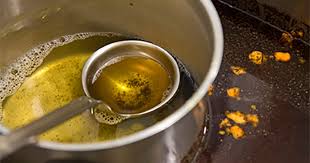Berita & Kegiatan
4 Myths about Fat Oil Grease

Pouring grease down the drain is always a bad idea regardless of if you pour hot water along with it or not.
Between cooking chicken, rendang or ketupat sayur, nasi goreng or aneka gorengan and other yummy dishes, at the end it will always give you a lot of grease to dispose of.
What tricks many people about grease is that, while you’re cooking with it, it’s a liquid. At higher than room temperatures, grease liquefies. And what do you do with liquid waste? Well, you pour it down the drain of course! Wow
Is pouring grease down the drain really all that bad?
The problem is that as soon as the grease cools, it congeals and plugs up your pipes. Over time, your drains will run slower and slower until they get clogged enough to wreak havoc. So let's debunk these four greasy myths about how to deal with grease.
What if you run hot water while you do it to keep it from congealing? Maybe a dash of dish soap can chase it down and be just enough for the grease to not get stuck. After all, once it’s gone, you’ll have nothing to worry about, right?
Let’s be Clear, about this four myths
Myth #1: It’s okay with hot water
False. The problem with fatty waste is that it will eventually congeal at room temperature. Even the hottest water will not be able to keep the grease warm forever and fatty residue will still coat the inside of your pipes, trapping other food particles.
Myth #2: Dish soap will do the trick
False. While it is true that dish soaps can break down fats temporarily, it’s not going to be enough to counteract the ill effects of grease forever. The companies who formulate dish soap intend for their products to clean your dishes not your drains. If they know and are willing to admit it can't do that, we shouldn't kid ourselves either.
Myth #3: Cooking oils that are liquid at room temperature are okay
False. While fats that are solid at room temperature pose the largest risk to the health of your pipes, canola and olive oil still cause issues. They are also hydrophobic, making it difficult to wash them out. As they coat the inside of your plumbing, food particles stick to the walls and gum up the whole operation.
Myth #4: But I have a grease trap
While it's true that grease trap can trap some grease with correct design and size volume. The grease trap will not change the how grease behaves once it finds its home in your pipes.
How to Properly Dispose of Grease
Pour all of the grease, fats, and cooking oils in a disposable container. An empty margarine container works great for this. Then, wipe down all oily dishes with a paper towel and throw it away.
Once all of the cooking, eating, and cleaning has been done for the day, tuck the grease container in the freezer (maybe include a note that says “not ice cream” just to be safe). The following day, you can place the container in the trash.
Here at Bio Eco Lestari we want you to keep your drains running smoothly. If you have any questions or a plumbing preventive treatment needs, call us at +62-817-1717-5810.
Berita & Kegiatan
© 2018 PT. Bio Eco Lestari. All rights reserved.